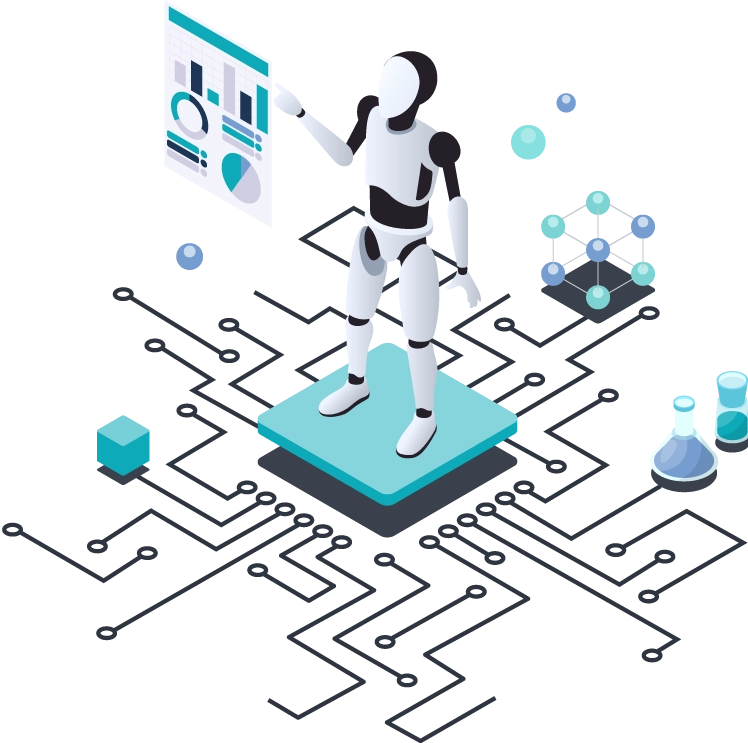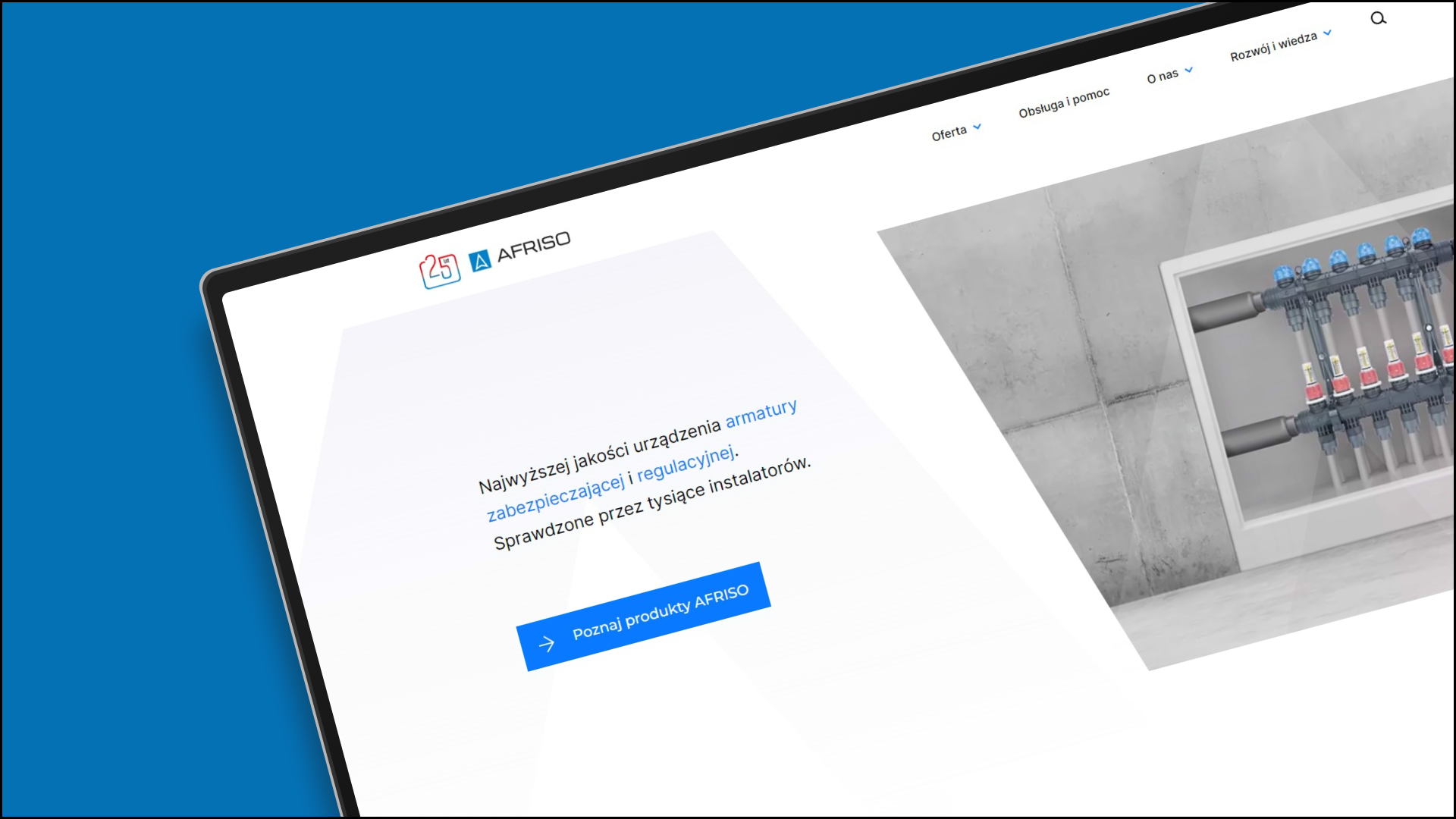Stärker företag med
AI
-lösningar
Vi är dedikerade till att hjälpa företag att växa och skala upp med hjälp av AI:s fulla potential.

Våra AI-tjänster
Med avancerad AI-teknologi hjälper vi organisationer att effektivisera verksamheten, förbättra kundengagemanget och driva innovation. Vi optimerar processer och möjliggör strategiskt beslutsfattande, vilket i slutändan sparar resurser och maximerar vinsten. Med fokus på etisk implementering och efterlevnad av juridiska standarder säkerställer vi att dina AI-initiativ är både ansvarsfulla och effektiva.

AI Services
Utveckla ansvarsfullt och bygg förtroende med etisk AI
Säkerställ att dina AI-system utvecklas och används på ett ansvarsfullt sätt. Våra experter ger vägledning om hur du följer lagar och etiska standarder, hjälper dig att undvika fallgropar och bygga upp förtroende hos dina intressenter. Du kan spara pengar och tid, validera åtgärder, proaktivt hantera problem och effektivisera AI-relaterade processer.
Läs mer om ossAI Services
AI-rådgivning och Business Workshops
Vi erbjuder strategisk planering och praktiska sessioner för att hjälpa dig att förstå och implementera AI på ett effektivt sätt. Våra experter identifierar användningsområden, utvärderar idéer och tillhandahåller proof of concept för att säkerställa att dina AI-initiativ är i linje med dina affärsmål.
Läs mer om oss
02
AI Lösningar

AI Services
Uppgradera dina produkter
med AI
Våra AI-integrationstjänster fokuserar på att smidigt integrera AI i dina befintliga produkter. Med djup kunskap om moderna AI-verktyg och förmågan att skapa skräddarsydda lösningar förbättrar vi både funktionaliteten och användarupplevelsen i dina produkter.
Läs mer om ossAI Services
Anpassade chatbottar och NLP-lösningar
Våra AI-integrationstjänster fokuserar på att smidigt införa AI i dina befintliga produkter. Med omfattande kunskap om moderna AI-verktyg och förmågan att skapa skräddarsydda lösningar förbättrar vi både produktens funktionalitet och användarupplevelse.
Läs mer om oss
04
AI Lösningar
Kunder som litar på oss
Ta reda på vad våra kunder tycker om att jobba med Primotly. Deras erfarenheter speglar vårt engagemang för att leverera utmärkta resultat och bygga långsiktiga samarbeten.
Din guide till en AI-driven framtid
Hur kan AI gynna mitt företag?
AI kan transformera ditt företag genom:
Effektiv dataanalys
AI kan snabbt bearbeta enorma mängder data, ge handlingsbara insikter och möjliggöra datadrivet beslutsfattande.
Uppgiftsautomatisering
Automatisera repetitiva uppgifter, minska kostnader och frigör resurser för mer strategiska aktiviteter.
Kundsupport 24/7
AI-drivna chattbotar och virtuella assistenter kan hantera kundförfrågningar dygnet runt, vilket förbättrar kundnöjdhet och lojalitet.
Prognos för marknadstrender
AI kan förutse marknadstrender och hjälpa ditt företag att ligga steget före konkurrenterna med vältajmade beslut.
Förbättrad cybersäkerhet
AI-system kan upptäcka och reagera på hot i realtid, skydda känslig data och säkerställa affärskontinuitet.
Optimerad lagerhantering
AI hjälper till att hantera lagernivåer, minska svinn och säkerställa att produkter finns tillgängliga när de behövs.
Hur mycket kostar det att implementera AI?
Kostnaden för att implementera AI varierar kraftigt beroende på faktorer som lösningens komplexitet, företagets storlek och den nivå av anpassning som krävs. Grundläggande AI-verktyg, såsom chatbotar eller AI-drivna analysplattformar, kan kosta några tusen dollar, medan mer sofistikerade, specialbyggda AI-system kan ligga på allt från hundratusentals till miljontals dollar. De viktigaste kostnadsfaktorerna inkluderar programvarulicenser, molninfrastruktur, datalagring samt rekrytering eller utbildning av personal.
Hur kan AI hjälpa mig att förbli konkurrenskraftig i min bransch?
AI ger ditt företag en konkurrensfördel genom att driva innovation, förbättra effektiviteten och förbättra kundupplevelser. Till exempel kan AI påskynda produktutvecklingen genom att optimera forsknings- och utvecklingsprocesser eller öka kundlojaliteten genom personliga rekommendationer och support. Genom att utnyttja AI kan ditt företag snabbt anpassa sig till marknadsförändringar och konsumenternas behov.
Kan AI-lösningar anpassas för att passa mina affärsbehov?
Absolut. AI-lösningar kan anpassas i hög grad för att möta ditt företags unika behov. Oavsett om du behöver en skräddarsydd chatbot för kundservice, en specialanpassad AI-modell för prediktiv analys eller en skräddarsydd integration med dina befintliga system, kan AI justeras för att passa dina specifika krav och säkerställa att den stödjer dina affärsmål.
Är AI lämpligt för småföretag och startups?
Ja, AI är mycket lämpligt för småföretag och startups. Dess skalbarhet gör det möjligt att anpassa AI-lösningar efter företagets storlek och specifika behov, vilket gör dem både prisvärda och praktiska. Genom att automatisera uppgifter och optimera verksamheten hjälper AI småföretag att åstadkomma mer med färre resurser, vilket skapar en mer jämn spelplan gentemot större konkurrenter.
Hur AI hjälper till att förbättra verksamheten inom olika branscher?
AI gör betydande framsteg inom olika branscher, var och en med unika tillämpningar anpassade efter specifika behov. Här är några nyckelexempel:
E-Handel
Inom e-handel förbättrar AI kundupplevelser genom personliga rekommendationer, prediktiv analys och automatiserad kundservice. AI-verktyg analyserar kundbeteende för att anpassa marknadsföringsinsatser och optimera produktförslag, vilket ökar konverteringsgraden och kundnöjdheten. Dessutom hjälper AI-driven lagerhantering e-handelsföretag att effektivt hantera lagret och minska svinn.
Bokföring
AI omvandlar redovisningsbranschen genom att automatisera rutinuppgifter såsom dataregistrering, fakturahantering och skatteförberedelser. AI-verktyg kan analysera finansiella data för att upptäcka avvikelser, minska fel och ge insikter i realtid, vilket gör det möjligt för revisorer att fokusera på strategiskt beslutsfattande och rådgivningstjänster. Detta leder till mer exakta finansiella rapporter och förbättrad efterlevnad av regelverk.
Resa
Inom resebranschen används AI för att anpassa reseupplevelser, optimera prissättning och förbättra kundservice. AI-drivna chatbots erbjuder omedelbar support till resenärer, medan prediktiv analys hjälper företag att förutse efterfrågan och justera priser dynamiskt. AI förbättrar också den operativa effektiviteten genom att optimera flygscheman och hantera bokningar mer effektivt.
Jordbruk
AI revolutionerar jordbruket genom precisionsodling, där AI-drivna verktyg analyserar data från sensorer, drönare och satelliter för att optimera skördar, övervaka jordhälsa och minska resursförbrukning. AI hjälper bönder att fatta välgrundade beslut om plantering, bevattning och skörd, vilket i slutändan leder till mer hållbara och produktiva jordbruksmetoder.
Utbildning
Inom utbildning personaliserar AI lärandeupplevelser genom att anpassa innehållet efter individuella studentbehov och ge omedelbar feedback. AI-drivna plattformar kan bedöma studenternas prestationer, identifiera kunskapsluckor och föreslå skräddarsydda resurser för att hjälpa dem att lyckas. Dessutom stödjer AI lärare genom att automatisera administrativa uppgifter och ge insikter om studenters engagemang och framsteg.
Hur kan AI hjälpa till att uppnå ESG-mål?
Artificiell intelligens blir i allt högre grad ett viktigt verktyg för att driva på initiativ inom miljö, socialt ansvar och bolagsstyrning (ESG) i olika branscher. AI:s förmåga att analysera enorma mängder data och leverera handlingsbara insikter hjälper organisationer att hantera kritiska ESG-utmaningar mer effektivt och smidigt.
Miljöpåverkan
AI spelar en betydande roll i att övervaka och bekämpa klimatförändringar. Till exempel kan AI-drivna modeller förutse miljöförändringar genom att analysera satellitdata för att spåra avskogning, övervaka utsläpp av växthusgaser och optimera energianvändning i realtid. AI används också för att skapa hållbara leveranskedjor genom att optimera logistik för att minska koldioxidavtryck och minimera avfall.
Socialt ansvar
Inom den sociala dimensionen förbättrar AI säkerheten på arbetsplatsen genom att förutse potentiella faror och säkerställa efterlevnad av säkerhetsföreskrifter. Dessutom spelar AI en avgörande roll i att främja mångfald och inkludering inom organisationer genom att identifiera och minska partiskhet i rekryteringsprocesser. AI-verktyg kan också underlätta samhällsengagemang genom att analysera sociala medier och annan offentlig data för att mäta allmänhetens sentiment och vägleda initiativ inom företagens sociala ansvar (CSR).
Styrning och efterlevnad
Styrning är ett annat område där AI bidrar avsevärt. AI kan förbättra transparens och rapportering genom att automatisera datainsamling och analys, vilket säkerställer korrekta och aktuella rapporteringar. Den hjälper också till med att upptäcka bedrägerier genom att analysera mönster som kan indikera misstänkta aktiviteter och därmed skydda mot ekonomisk brottslighet. Dessutom kan AI bistå i analysen av styrelsesammansättningen för att säkerställa en mångsidig och effektiv styrningsstruktur.
Att integrera AI i ESG-strategier hjälper inte bara organisationer att uppfylla regulatoriska krav, utan bygger också förtroende hos intressenter genom att visa ett engagemang för etiska och hållbara metoder.
Vilka är vanliga utmaningar vid implementering av AI?
Att implementera AI i affärsverksamheten medför betydande utmaningar som organisationer måste hantera noggrant. Dessa utmaningar sträcker sig från tekniska komplexiteter till etiska överväganden, vilka alla påverkar en framgångsrik implementering av AI-lösningar.
Förtroende och förklarbarhet
Att bygga förtroende för AI-system är avgörande för deras adoption, men det är ofta en utmaning på grund av den 'black box'-karaktär som många AI-algoritmer har. Dessa algoritmer fattar beslut baserade på komplexa beräkningar som kan vara svåra att förstå, även för experter. Denna brist på förklarbarhet kan leda till skepsis bland användare, särskilt inom kritiska områden som finans och sjukvård, där det är avgörande att förstå hur ett beslut har fattats. Organisationer måste arbeta med att utveckla förklarbara AI-modeller som ger insikter i beslutsprocessen och därigenom bidrar till att bygga förtroende bland användare och intressenter.
Säkerhet
AI-system kräver ofta tillgång till stora mängder data, varav en betydande del är känslig eller personlig. Att säkerställa dataskydd och säkerhet är en stor utmaning, särskilt med strikta regleringar som GDPR i Europa och CCPA i Kalifornien. Företag måste implementera robusta dataskyddsåtgärder, inklusive kryptering, säker datalagring och åtkomstkontroller, för att förhindra dataintrång och säkerställa efterlevnad av dessa regelverk. Underlåtenhet att skydda data kan leda till juridiska konsekvenser, ekonomiska förluster och skada organisationens rykte.
Algoritmisk partiskhet och diskriminering
AI-system kan oavsiktligt upprätthålla fördomar som finns i de data de tränats på, vilket kan leda till diskriminerande resultat. Till exempel kan AI som används i rekryteringsprocesser gynna vissa demografiska grupper framför andra om träningsdatan speglar befintliga partiskheter. Att hantera denna utmaning kräver noggrant urval av träningsdata, regelbundna granskningar av AI-system för bias samt implementering av rättvisemedvetna maskininlärningstekniker. Företag måste vara proaktiva i att identifiera och motverka bias för att säkerställa att deras AI-system är rättvisa och jämlika.
Integration med befintliga system
Att integrera AI i befintliga affärsprocesser och IT-infrastruktur kan vara komplext och resurskrävande. AI-lösningar kräver ofta betydande förändringar i arbetsflöden, vilket kan vara störande och möta motstånd från anställda. Dessutom kanske äldre system inte är kompatibla med ny AI-teknik, vilket kan kräva kostsamma uppgraderingar eller ersättningar. Organisationer behöver planera noggrant för att säkerställa att AI-lösningar är i linje med den övergripande affärsstrategin och att medarbetarna är tillräckligt utbildade för att arbeta med dessa nya system.
Höga kostnader och resurskrav
Implementeringen av AI-teknologier kan vara kostsam, särskilt för skräddarsydda lösningar som kräver omfattande utveckling och kontinuerligt underhåll. Kostnaderna inkluderar inte bara själva tekniken utan också behovet av specialiserad kompetens, såsom dataspecialister och AI-ingenjörer, som är eftertraktade och har höga löner. Särskilt mindre företag kan ha svårt att motivera den initiala investeringen i AI utan tydliga och omedelbara avkastningar.
Etisk och regulatorisk efterlevnad
I takt med att AI blir alltmer utbrett granskar tillsynsmyndigheter världen över dess användning i allt högre grad, vilket skapar ett komplext regelverk som företag måste hantera. Att säkerställa efterlevnad av dessa regler är avgörande men kan vara utmanande, särskilt eftersom lagstiftningen ständigt förändras. Utöver efterlevnad måste organisationer även ta hänsyn till de etiska aspekterna av sina AI-system, för att säkerställa att de används ansvarsfullt och inte orsakar skada. Detta inkluderar att hantera frågor såsom AI:s påverkan på arbetstillfällen, dess roll i övervakning och risken för missbruk.
Att hantera förväntningar
AI framställs ofta som en lösning på alla affärsproblem, vilket leder till orealistiska förväntningar. När AI-system inte lever upp till dessa förväntningar kan det resultera i besvikelse och en förlust av förtroende för teknologin. Det är avgörande för företag att sätta realistiska mål för sina AI-initiativ, tydligt kommunicera vad AI kan och inte kan göra samt hantera intressenternas förväntningar under hela implementeringsprocessen.
Genom att förstå och hantera dessa utmaningar kan företag bättre positionera sig för att framgångsrikt implementera AI, utnyttja dess potential och samtidigt minimera riskerna.
Etik och AI: Varför är det viktigt?
I takt med att artificiell intelligens (AI) fortsätter att genomsyra olika aspekter av affärslivet och samhället, blir etiska överväganden allt viktigare. Etisk AI handlar inte bara om att undvika skada; det handlar om att säkerställa att AI-system används ansvarsfullt och bidrar positivt till samhället. Här är nyckelaspekter av etisk AI-implementering:
Rättvisa och förmildring av bias
En av de främsta etiska utmaningarna med AI är risken för partiskhet, vilket kan leda till orättvis behandling av individer eller grupper. AI-system tränas på data som kan innehålla historiska fördomar, vilka kan förstärkas eller till och med förvärras i AI-drivna beslut. Till exempel kan AI inom rekrytering gynna vissa demografiska grupper om träningsdatan speglar tidigare partiska anställningsmetoder. Att minska partiskhet kräver en mångfacetterad strategi, inklusive mångsidiga och representativa datamängder, kontinuerlig övervakning av AI:s resultat och användning av algoritmer som är utformade för att minimera partiskhet.
Transparens och förklarbarhet
Transparens är en förmåga att förstå och förklara hur AI-system fattar beslut. Detta är avgörande för att bygga förtroende, särskilt inom områden med höga insatser som finans, hälso- och sjukvård samt straffrätt, där besluten kan ha stor inverkan på individers liv. Förklarbar AI (XAI) syftar till att göra AI-modellers inre funktioner mer begripliga för icke-experter genom att ge tydliga insikter i hur beslut fattas och varför vissa resultat uppnås. Denna transparens är inte bara viktig för användarnas förtroende, utan även för efter
Ansvarsskyldighet & Ansvar
Med den ökande användningen av AI finns ett växande behov av ansvarsskyldighet i hur AI-system utvecklas och implementeras. Det innebär att det måste finnas en tydlig ansvarsfördelning för AI-drivna resultat, särskilt när något går fel. Organisationer måste upprätta styrningsramverk som definierar vem som är ansvarig för AI-systemens beslut och konsekvenser. Detta kan innebära att skapa etiska kommittéer, införa granskningsspår för AI samt upprätta mekanismer för rättelse vid fel eller partiskhet.
Integritet & Dataskydd
AI-system förlitar sig ofta på stora mängder data, varav en betydande del kan vara personlig eller känslig. Att skydda denna data från obehörig åtkomst, missbruk eller dataintrång är avgörande. Etisk AI-implementering kräver robusta dataskyddsåtgärder, såsom kryptering, anonymisering och strikta åtkomstkontroller. Dessutom måste företag säkerställa efterlevnad av dataskyddsförordningar, såsom GDPR i Europa, som ställer specifika krav på datahantering och användarsamtycke
AI:s påverkan på sysselsättningen
AI's potential to automate jobs poses significant ethical challenges, particularly concerning job displacement and the future of work. While AI can increase efficiency and reduce costs, it also risks displacing workers, particularly in industries where tasks are highly repetitive and can be easily automated. Ethical AI implementation involves considering the impact on workers, including strategies for reskilling and upskilling employees to transition into new roles that AI creates. Organizations need to balance the benefits of AI with the social responsibility of supporting their workforce through these transitions.
Miljöpåverkan av AI
Den miljöpåverkan som AI har är en framväxande etisk fråga, särskilt eftersom AI-system, och i synnerhet stora modeller, kräver betydande beräkningsresurser som förbrukar stora mängder energi. Denna energiförbrukning kan bidra till koldioxidutsläpp och därmed motverka hållbarhetsmål. Etiska AI-praktiker innefattar att optimera AI-system för energieffektivitet, använda förnybara energikällor och beakta AI-utvecklingens och -implementeringens miljöavtryck. Detta ligger i linje med bredare företagsinitiativ för hållbarhet och det växande fokuset på miljö-, sociala och styrningsfaktorer (ESG) inom näringslivet.
Juridisk och regulatorisk efterlevnad
I takt med att regeringar världen över i allt högre grad reglerar AI, måste företag navigera i en komplex miljö av lagar och bestämmelser som styr AI-användning. Efterlevnad av dessa regler är inte bara ett juridiskt krav utan också en etisk skyldighet. Lagar som Europeiska unionens AI-lag klassificerar AI-system baserat på risknivå och ställer strikta krav på hög-risk AI-applikationer. Etisk AI-implementering innebär att hålla sig informerad om dessa regler, säkerställa efterlevnad och aktivt delta i policydiskussioner för att forma en rättvis och effektiv AI-styrning.
Att integrera dessa etiska överväganden i utveckling och implementering av AI är avgörande för att företag ska kunna dra nytta av AI samtidigt som risker minimeras och AI-system bidrar positivt till samhället. Etisk AI är inte bara en teknisk utmaning utan även ett bredare socialt ansvar som kräver noggrann planering, transparens och ett engagemang för rättvisa och mänskligt välbefinnande.
Förbereda sig för framtiden med AI
Allt eftersom AI fortsätter att utvecklas blir dess integration i affärsstrategin alltmer avgörande för att förbli konkurrenskraftig. För att förbereda sig effektivt inför framtiden måste företag anta en strategisk ansats som går bortom enbart implementering. Här är hur AI kan integreras strategiskt i affärsverksamheten för långsiktig framgång:
Anpassa AI efter affärsmål
För att maximera fördelarna med AI är det avgörande att dess implementering är nära anpassad till organisationens övergripande affärsmål. Det innebär att identifiera nyckelområden där AI kan ha störst påverkan, såsom att förbättra kundupplevelsen, öka operativ effektivitet eller driva innovation. Genom att anpassa AI-initiativ till strategiska mål kan företag säkerställa att AI-investeringar bidrar direkt till deras framgång och tillväxt.
Utveckling av en omfattande AI-roadmap
En välstrukturerad AI-roadmap är avgörande för att styra implementeringsprocessen och säkerställa att AI-teknologier införs effektivt inom organisationen. Denna roadmap bör beskriva stegen för AI-adoption, inklusive pilotprojekt, skalning och fullständig integrering i affärsprocesser. Den bör också ta hänsyn till nödvändiga resurser, tidsramar och potentiella risker. Genom att ha en tydlig plan kan företag navigera genom AI-implementationens komplexitet och undvika vanliga fallgropar.
Att bygga en AI-redo kultur
En framgångsrik implementering av AI kräver mer än bara teknik; det kräver en kulturell förändring inom organisationen. Detta innebär att främja en mentalitet som omfamnar innovation och kontinuerligt lärande. Medarbetarna bör uppmuntras att utveckla nya färdigheter och anpassa sig till AI-drivna förändringar i sina roller. Ledarskapet spelar en avgörande roll i att driva denna kulturella omvandling genom att främja en tydlig vision för AI och säkerställa att teamen får stöd under hela övergången.
Att investera i talang och kompetensutveckling
AI:s fulla potential kan endast realiseras om företag har rätt talang på plats. Det handlar inte bara om dataforskare och AI-specialister, utan också om medarbetare som kan överbrygga klyftan mellan tekniska och affärsrelaterade team. Att investera i kontinuerlig utbildning och kompetensutveckling är avgörande för att ge arbetsstyrkan den kunskap de behöver för att arbeta effektivt med AI. Dessutom bör företag överväga samarbeten med utbildningsinstitutioner eller teknikföretag för att få tillgång till den senaste AI-expertisen och de mest avancerade verktygen.
AI:s påverkan på anställning
AI:s potential att automatisera jobb medför betydande etiska utmaningar, särskilt när det gäller jobbförlust och arbetsmarknadens framtid. Även om AI kan öka effektiviteten och minska kostnaderna, finns det också en risk att arbetstagare trängs ut, särskilt inom branscher där arbetsuppgifter är mycket repetitiva och lätt kan automatiseras. En etisk implementering av AI innebär att man tar hänsyn till dess påverkan på arbetstagare, inklusive strategier för omskolning och kompetensutveckling för att möjliggöra en övergång till nya roller som AI skapar. Organisationer behöver balansera AI:s fördelar med det sociala ansvaret att stödja sin arbetskraft genom dessa förändringar.
Betoning på etiska AI-praktiker
I takt med att AI blir alltmer integrerat i affärsverksamheten måste etiska överväganden stå i centrum för AI-strategin. Detta innefattar att säkerställa transparens, rättvisa och ansvarsskyldighet i AI-system. Företag bör upprätta tydliga etiska riktlinjer för utveckling och implementering av AI, med fokus på frågor såsom partiskhet, integritet och AI:s påverkan på arbetsmarknaden. Genom att prioritera etiska metoder kan organisationer bygga förtroende hos kunder och intressenter, vilket är avgörande för långsiktig framgång.
Ligga steget före regeländringar
Den regulatoriska miljön för AI utvecklas snabbt, med nya lagar och riktlinjer som introduceras för att hantera de etiska och samhälleliga effekterna av AI. Företag måste hålla sig informerade om dessa förändringar och säkerställa att deras AI-initiativ följer nuvarande och framtida regleringar. Detta kan innebära ett nära samarbete med juridiska team, deltagande i branschdiskussioner och förespråkande av rättvis och effektiv AI-styrning. Ett proaktivt engagemang med tillsynsmyndigheter kan också hjälpa företag att förutse och anpassa sig till regulatoriska utvecklingar, vilket minskar risken för kostsamma efterlevnadsproblem i framtiden.
Konkurrensfördel
AI är ett kraftfullt verktyg för att skaffa sig en konkurrensfördel på marknaden. Genom att använda AI för innovation, optimering av verksamheten och förbättring av kundupplevelser kan företag särskilja sig från konkurrenterna. Till exempel kan AI användas för att utveckla nya produkter snabbare, skapa mer personliga marknadsföringsstrategier eller förbättra effektiviteten i leveranskedjan. Nyckeln är att kontinuerligt utforska nya AI-applikationer som kan ge unikt värde till kunderna och hålla företaget steget före konkurrensen.
Förberedelse för framtida AI-framsteg
AI-teknologin utvecklas snabbt, och företag måste vara förberedda på nästa våg av innovationer. Det innebär att hålla sig informerade om framväxande AI-trender, såsom kvant-AI, multimodala AI-modeller och AI-driven automatisering inom mjukvaruutveckling. Företag bör vara redo att experimentera med dessa nya teknologier och integrera dem i sin verksamhet i takt med att de mognar. Genom att vara flexibla och öppna för förändring kan företag säkerställa att de är väl positionerade för att dra nytta av framtida AI-framsteg.
Hur kan AI gynna mitt företag?
AI kan transformera ditt företag genom:
Effektiv dataanalys
AI kan snabbt bearbeta enorma mängder data, ge handlingsbara insikter och möjliggöra datadrivet beslutsfattande.
Uppgiftsautomatisering
Automatisera repetitiva uppgifter, minska kostnader och frigör resurser för mer strategiska aktiviteter.
Kundsupport 24/7
AI-drivna chattbotar och virtuella assistenter kan hantera kundförfrågningar dygnet runt, vilket förbättrar kundnöjdhet och lojalitet.
Prognos för marknadstrender
AI kan förutse marknadstrender och hjälpa ditt företag att ligga steget före konkurrenterna med vältajmade beslut.
Förbättrad cybersäkerhet
AI-system kan upptäcka och reagera på hot i realtid, skydda känslig data och säkerställa affärskontinuitet.
Optimerad lagerhantering
AI hjälper till att hantera lagernivåer, minska svinn och säkerställa att produkter finns tillgängliga när de behövs.
Hur mycket kostar det att implementera AI?
Kostnaden för att implementera AI varierar kraftigt beroende på faktorer som lösningens komplexitet, företagets storlek och den nivå av anpassning som krävs. Grundläggande AI-verktyg, såsom chatbotar eller AI-drivna analysplattformar, kan kosta några tusen dollar, medan mer sofistikerade, specialbyggda AI-system kan ligga på allt från hundratusentals till miljontals dollar. De viktigaste kostnadsfaktorerna inkluderar programvarulicenser, molninfrastruktur, datalagring samt rekrytering eller utbildning av personal.
Hur kan AI hjälpa mig att förbli konkurrenskraftig i min bransch?
AI ger ditt företag en konkurrensfördel genom att driva innovation, förbättra effektiviteten och förbättra kundupplevelser. Till exempel kan AI påskynda produktutvecklingen genom att optimera forsknings- och utvecklingsprocesser eller öka kundlojaliteten genom personliga rekommendationer och support. Genom att utnyttja AI kan ditt företag snabbt anpassa sig till marknadsförändringar och konsumenternas behov.
Kan AI-lösningar anpassas för att passa mina affärsbehov?
Absolut. AI-lösningar kan anpassas i hög grad för att möta ditt företags unika behov. Oavsett om du behöver en skräddarsydd chatbot för kundservice, en specialanpassad AI-modell för prediktiv analys eller en skräddarsydd integration med dina befintliga system, kan AI justeras för att passa dina specifika krav och säkerställa att den stödjer dina affärsmål.
Är AI lämpligt för småföretag och startups?
Ja, AI är mycket lämpligt för småföretag och startups. Dess skalbarhet gör det möjligt att anpassa AI-lösningar efter företagets storlek och specifika behov, vilket gör dem både prisvärda och praktiska. Genom att automatisera uppgifter och optimera verksamheten hjälper AI småföretag att åstadkomma mer med färre resurser, vilket skapar en mer jämn spelplan gentemot större konkurrenter.
Hur AI hjälper till att förbättra verksamheten inom olika branscher?
AI gör betydande framsteg inom olika branscher, var och en med unika tillämpningar anpassade efter specifika behov. Här är några nyckelexempel:
E-Handel
Inom e-handel förbättrar AI kundupplevelser genom personliga rekommendationer, prediktiv analys och automatiserad kundservice. AI-verktyg analyserar kundbeteende för att anpassa marknadsföringsinsatser och optimera produktförslag, vilket ökar konverteringsgraden och kundnöjdheten. Dessutom hjälper AI-driven lagerhantering e-handelsföretag att effektivt hantera lagret och minska svinn.
Bokföring
AI omvandlar redovisningsbranschen genom att automatisera rutinuppgifter såsom dataregistrering, fakturahantering och skatteförberedelser. AI-verktyg kan analysera finansiella data för att upptäcka avvikelser, minska fel och ge insikter i realtid, vilket gör det möjligt för revisorer att fokusera på strategiskt beslutsfattande och rådgivningstjänster. Detta leder till mer exakta finansiella rapporter och förbättrad efterlevnad av regelverk.
Resa
Inom resebranschen används AI för att anpassa reseupplevelser, optimera prissättning och förbättra kundservice. AI-drivna chatbots erbjuder omedelbar support till resenärer, medan prediktiv analys hjälper företag att förutse efterfrågan och justera priser dynamiskt. AI förbättrar också den operativa effektiviteten genom att optimera flygscheman och hantera bokningar mer effektivt.
Jordbruk
AI revolutionerar jordbruket genom precisionsodling, där AI-drivna verktyg analyserar data från sensorer, drönare och satelliter för att optimera skördar, övervaka jordhälsa och minska resursförbrukning. AI hjälper bönder att fatta välgrundade beslut om plantering, bevattning och skörd, vilket i slutändan leder till mer hållbara och produktiva jordbruksmetoder.
Utbildning
Inom utbildning personaliserar AI lärandeupplevelser genom att anpassa innehållet efter individuella studentbehov och ge omedelbar feedback. AI-drivna plattformar kan bedöma studenternas prestationer, identifiera kunskapsluckor och föreslå skräddarsydda resurser för att hjälpa dem att lyckas. Dessutom stödjer AI lärare genom att automatisera administrativa uppgifter och ge insikter om studenters engagemang och framsteg.
Hur kan AI hjälpa till att uppnå ESG-mål?
Artificiell intelligens blir i allt högre grad ett viktigt verktyg för att driva på initiativ inom miljö, socialt ansvar och bolagsstyrning (ESG) i olika branscher. AI:s förmåga att analysera enorma mängder data och leverera handlingsbara insikter hjälper organisationer att hantera kritiska ESG-utmaningar mer effektivt och smidigt.
Miljöpåverkan
AI spelar en betydande roll i att övervaka och bekämpa klimatförändringar. Till exempel kan AI-drivna modeller förutse miljöförändringar genom att analysera satellitdata för att spåra avskogning, övervaka utsläpp av växthusgaser och optimera energianvändning i realtid. AI används också för att skapa hållbara leveranskedjor genom att optimera logistik för att minska koldioxidavtryck och minimera avfall.
Socialt ansvar
Inom den sociala dimensionen förbättrar AI säkerheten på arbetsplatsen genom att förutse potentiella faror och säkerställa efterlevnad av säkerhetsföreskrifter. Dessutom spelar AI en avgörande roll i att främja mångfald och inkludering inom organisationer genom att identifiera och minska partiskhet i rekryteringsprocesser. AI-verktyg kan också underlätta samhällsengagemang genom att analysera sociala medier och annan offentlig data för att mäta allmänhetens sentiment och vägleda initiativ inom företagens sociala ansvar (CSR).
Styrning och efterlevnad
Styrning är ett annat område där AI bidrar avsevärt. AI kan förbättra transparens och rapportering genom att automatisera datainsamling och analys, vilket säkerställer korrekta och aktuella rapporteringar. Den hjälper också till med att upptäcka bedrägerier genom att analysera mönster som kan indikera misstänkta aktiviteter och därmed skydda mot ekonomisk brottslighet. Dessutom kan AI bistå i analysen av styrelsesammansättningen för att säkerställa en mångsidig och effektiv styrningsstruktur.
Att integrera AI i ESG-strategier hjälper inte bara organisationer att uppfylla regulatoriska krav, utan bygger också förtroende hos intressenter genom att visa ett engagemang för etiska och hållbara metoder.
Vilka är vanliga utmaningar vid implementering av AI?
Att implementera AI i affärsverksamheten medför betydande utmaningar som organisationer måste hantera noggrant. Dessa utmaningar sträcker sig från tekniska komplexiteter till etiska överväganden, vilka alla påverkar en framgångsrik implementering av AI-lösningar.
Förtroende och förklarbarhet
Att bygga förtroende för AI-system är avgörande för deras adoption, men det är ofta en utmaning på grund av den 'black box'-karaktär som många AI-algoritmer har. Dessa algoritmer fattar beslut baserade på komplexa beräkningar som kan vara svåra att förstå, även för experter. Denna brist på förklarbarhet kan leda till skepsis bland användare, särskilt inom kritiska områden som finans och sjukvård, där det är avgörande att förstå hur ett beslut har fattats. Organisationer måste arbeta med att utveckla förklarbara AI-modeller som ger insikter i beslutsprocessen och därigenom bidrar till att bygga förtroende bland användare och intressenter.
Säkerhet
AI-system kräver ofta tillgång till stora mängder data, varav en betydande del är känslig eller personlig. Att säkerställa dataskydd och säkerhet är en stor utmaning, särskilt med strikta regleringar som GDPR i Europa och CCPA i Kalifornien. Företag måste implementera robusta dataskyddsåtgärder, inklusive kryptering, säker datalagring och åtkomstkontroller, för att förhindra dataintrång och säkerställa efterlevnad av dessa regelverk. Underlåtenhet att skydda data kan leda till juridiska konsekvenser, ekonomiska förluster och skada organisationens rykte.
Algoritmisk partiskhet och diskriminering
AI-system kan oavsiktligt upprätthålla fördomar som finns i de data de tränats på, vilket kan leda till diskriminerande resultat. Till exempel kan AI som används i rekryteringsprocesser gynna vissa demografiska grupper framför andra om träningsdatan speglar befintliga partiskheter. Att hantera denna utmaning kräver noggrant urval av träningsdata, regelbundna granskningar av AI-system för bias samt implementering av rättvisemedvetna maskininlärningstekniker. Företag måste vara proaktiva i att identifiera och motverka bias för att säkerställa att deras AI-system är rättvisa och jämlika.
Integration med befintliga system
Att integrera AI i befintliga affärsprocesser och IT-infrastruktur kan vara komplext och resurskrävande. AI-lösningar kräver ofta betydande förändringar i arbetsflöden, vilket kan vara störande och möta motstånd från anställda. Dessutom kanske äldre system inte är kompatibla med ny AI-teknik, vilket kan kräva kostsamma uppgraderingar eller ersättningar. Organisationer behöver planera noggrant för att säkerställa att AI-lösningar är i linje med den övergripande affärsstrategin och att medarbetarna är tillräckligt utbildade för att arbeta med dessa nya system.
Höga kostnader och resurskrav
Implementeringen av AI-teknologier kan vara kostsam, särskilt för skräddarsydda lösningar som kräver omfattande utveckling och kontinuerligt underhåll. Kostnaderna inkluderar inte bara själva tekniken utan också behovet av specialiserad kompetens, såsom dataspecialister och AI-ingenjörer, som är eftertraktade och har höga löner. Särskilt mindre företag kan ha svårt att motivera den initiala investeringen i AI utan tydliga och omedelbara avkastningar.
Etisk och regulatorisk efterlevnad
I takt med att AI blir alltmer utbrett granskar tillsynsmyndigheter världen över dess användning i allt högre grad, vilket skapar ett komplext regelverk som företag måste hantera. Att säkerställa efterlevnad av dessa regler är avgörande men kan vara utmanande, särskilt eftersom lagstiftningen ständigt förändras. Utöver efterlevnad måste organisationer även ta hänsyn till de etiska aspekterna av sina AI-system, för att säkerställa att de används ansvarsfullt och inte orsakar skada. Detta inkluderar att hantera frågor såsom AI:s påverkan på arbetstillfällen, dess roll i övervakning och risken för missbruk.
Att hantera förväntningar
AI framställs ofta som en lösning på alla affärsproblem, vilket leder till orealistiska förväntningar. När AI-system inte lever upp till dessa förväntningar kan det resultera i besvikelse och en förlust av förtroende för teknologin. Det är avgörande för företag att sätta realistiska mål för sina AI-initiativ, tydligt kommunicera vad AI kan och inte kan göra samt hantera intressenternas förväntningar under hela implementeringsprocessen.
Genom att förstå och hantera dessa utmaningar kan företag bättre positionera sig för att framgångsrikt implementera AI, utnyttja dess potential och samtidigt minimera riskerna.
Etik och AI: Varför är det viktigt?
I takt med att artificiell intelligens (AI) fortsätter att genomsyra olika aspekter av affärslivet och samhället, blir etiska överväganden allt viktigare. Etisk AI handlar inte bara om att undvika skada; det handlar om att säkerställa att AI-system används ansvarsfullt och bidrar positivt till samhället. Här är nyckelaspekter av etisk AI-implementering:
Rättvisa och förmildring av bias
En av de främsta etiska utmaningarna med AI är risken för partiskhet, vilket kan leda till orättvis behandling av individer eller grupper. AI-system tränas på data som kan innehålla historiska fördomar, vilka kan förstärkas eller till och med förvärras i AI-drivna beslut. Till exempel kan AI inom rekrytering gynna vissa demografiska grupper om träningsdatan speglar tidigare partiska anställningsmetoder. Att minska partiskhet kräver en mångfacetterad strategi, inklusive mångsidiga och representativa datamängder, kontinuerlig övervakning av AI:s resultat och användning av algoritmer som är utformade för att minimera partiskhet.
Transparens och förklarbarhet
Transparens är en förmåga att förstå och förklara hur AI-system fattar beslut. Detta är avgörande för att bygga förtroende, särskilt inom områden med höga insatser som finans, hälso- och sjukvård samt straffrätt, där besluten kan ha stor inverkan på individers liv. Förklarbar AI (XAI) syftar till att göra AI-modellers inre funktioner mer begripliga för icke-experter genom att ge tydliga insikter i hur beslut fattas och varför vissa resultat uppnås. Denna transparens är inte bara viktig för användarnas förtroende, utan även för efter
Ansvarsskyldighet & Ansvar
Med den ökande användningen av AI finns ett växande behov av ansvarsskyldighet i hur AI-system utvecklas och implementeras. Det innebär att det måste finnas en tydlig ansvarsfördelning för AI-drivna resultat, särskilt när något går fel. Organisationer måste upprätta styrningsramverk som definierar vem som är ansvarig för AI-systemens beslut och konsekvenser. Detta kan innebära att skapa etiska kommittéer, införa granskningsspår för AI samt upprätta mekanismer för rättelse vid fel eller partiskhet.
Integritet & Dataskydd
AI-system förlitar sig ofta på stora mängder data, varav en betydande del kan vara personlig eller känslig. Att skydda denna data från obehörig åtkomst, missbruk eller dataintrång är avgörande. Etisk AI-implementering kräver robusta dataskyddsåtgärder, såsom kryptering, anonymisering och strikta åtkomstkontroller. Dessutom måste företag säkerställa efterlevnad av dataskyddsförordningar, såsom GDPR i Europa, som ställer specifika krav på datahantering och användarsamtycke
AI:s påverkan på sysselsättningen
AI's potential to automate jobs poses significant ethical challenges, particularly concerning job displacement and the future of work. While AI can increase efficiency and reduce costs, it also risks displacing workers, particularly in industries where tasks are highly repetitive and can be easily automated. Ethical AI implementation involves considering the impact on workers, including strategies for reskilling and upskilling employees to transition into new roles that AI creates. Organizations need to balance the benefits of AI with the social responsibility of supporting their workforce through these transitions.
Miljöpåverkan av AI
Den miljöpåverkan som AI har är en framväxande etisk fråga, särskilt eftersom AI-system, och i synnerhet stora modeller, kräver betydande beräkningsresurser som förbrukar stora mängder energi. Denna energiförbrukning kan bidra till koldioxidutsläpp och därmed motverka hållbarhetsmål. Etiska AI-praktiker innefattar att optimera AI-system för energieffektivitet, använda förnybara energikällor och beakta AI-utvecklingens och -implementeringens miljöavtryck. Detta ligger i linje med bredare företagsinitiativ för hållbarhet och det växande fokuset på miljö-, sociala och styrningsfaktorer (ESG) inom näringslivet.
Juridisk och regulatorisk efterlevnad
I takt med att regeringar världen över i allt högre grad reglerar AI, måste företag navigera i en komplex miljö av lagar och bestämmelser som styr AI-användning. Efterlevnad av dessa regler är inte bara ett juridiskt krav utan också en etisk skyldighet. Lagar som Europeiska unionens AI-lag klassificerar AI-system baserat på risknivå och ställer strikta krav på hög-risk AI-applikationer. Etisk AI-implementering innebär att hålla sig informerad om dessa regler, säkerställa efterlevnad och aktivt delta i policydiskussioner för att forma en rättvis och effektiv AI-styrning.
Att integrera dessa etiska överväganden i utveckling och implementering av AI är avgörande för att företag ska kunna dra nytta av AI samtidigt som risker minimeras och AI-system bidrar positivt till samhället. Etisk AI är inte bara en teknisk utmaning utan även ett bredare socialt ansvar som kräver noggrann planering, transparens och ett engagemang för rättvisa och mänskligt välbefinnande.
Förbereda sig för framtiden med AI
Allt eftersom AI fortsätter att utvecklas blir dess integration i affärsstrategin alltmer avgörande för att förbli konkurrenskraftig. För att förbereda sig effektivt inför framtiden måste företag anta en strategisk ansats som går bortom enbart implementering. Här är hur AI kan integreras strategiskt i affärsverksamheten för långsiktig framgång:
Anpassa AI efter affärsmål
För att maximera fördelarna med AI är det avgörande att dess implementering är nära anpassad till organisationens övergripande affärsmål. Det innebär att identifiera nyckelområden där AI kan ha störst påverkan, såsom att förbättra kundupplevelsen, öka operativ effektivitet eller driva innovation. Genom att anpassa AI-initiativ till strategiska mål kan företag säkerställa att AI-investeringar bidrar direkt till deras framgång och tillväxt.
Utveckling av en omfattande AI-roadmap
En välstrukturerad AI-roadmap är avgörande för att styra implementeringsprocessen och säkerställa att AI-teknologier införs effektivt inom organisationen. Denna roadmap bör beskriva stegen för AI-adoption, inklusive pilotprojekt, skalning och fullständig integrering i affärsprocesser. Den bör också ta hänsyn till nödvändiga resurser, tidsramar och potentiella risker. Genom att ha en tydlig plan kan företag navigera genom AI-implementationens komplexitet och undvika vanliga fallgropar.
Att bygga en AI-redo kultur
En framgångsrik implementering av AI kräver mer än bara teknik; det kräver en kulturell förändring inom organisationen. Detta innebär att främja en mentalitet som omfamnar innovation och kontinuerligt lärande. Medarbetarna bör uppmuntras att utveckla nya färdigheter och anpassa sig till AI-drivna förändringar i sina roller. Ledarskapet spelar en avgörande roll i att driva denna kulturella omvandling genom att främja en tydlig vision för AI och säkerställa att teamen får stöd under hela övergången.
Att investera i talang och kompetensutveckling
AI:s fulla potential kan endast realiseras om företag har rätt talang på plats. Det handlar inte bara om dataforskare och AI-specialister, utan också om medarbetare som kan överbrygga klyftan mellan tekniska och affärsrelaterade team. Att investera i kontinuerlig utbildning och kompetensutveckling är avgörande för att ge arbetsstyrkan den kunskap de behöver för att arbeta effektivt med AI. Dessutom bör företag överväga samarbeten med utbildningsinstitutioner eller teknikföretag för att få tillgång till den senaste AI-expertisen och de mest avancerade verktygen.
AI:s påverkan på anställning
AI:s potential att automatisera jobb medför betydande etiska utmaningar, särskilt när det gäller jobbförlust och arbetsmarknadens framtid. Även om AI kan öka effektiviteten och minska kostnaderna, finns det också en risk att arbetstagare trängs ut, särskilt inom branscher där arbetsuppgifter är mycket repetitiva och lätt kan automatiseras. En etisk implementering av AI innebär att man tar hänsyn till dess påverkan på arbetstagare, inklusive strategier för omskolning och kompetensutveckling för att möjliggöra en övergång till nya roller som AI skapar. Organisationer behöver balansera AI:s fördelar med det sociala ansvaret att stödja sin arbetskraft genom dessa förändringar.
Betoning på etiska AI-praktiker
I takt med att AI blir alltmer integrerat i affärsverksamheten måste etiska överväganden stå i centrum för AI-strategin. Detta innefattar att säkerställa transparens, rättvisa och ansvarsskyldighet i AI-system. Företag bör upprätta tydliga etiska riktlinjer för utveckling och implementering av AI, med fokus på frågor såsom partiskhet, integritet och AI:s påverkan på arbetsmarknaden. Genom att prioritera etiska metoder kan organisationer bygga förtroende hos kunder och intressenter, vilket är avgörande för långsiktig framgång.
Ligga steget före regeländringar
Den regulatoriska miljön för AI utvecklas snabbt, med nya lagar och riktlinjer som introduceras för att hantera de etiska och samhälleliga effekterna av AI. Företag måste hålla sig informerade om dessa förändringar och säkerställa att deras AI-initiativ följer nuvarande och framtida regleringar. Detta kan innebära ett nära samarbete med juridiska team, deltagande i branschdiskussioner och förespråkande av rättvis och effektiv AI-styrning. Ett proaktivt engagemang med tillsynsmyndigheter kan också hjälpa företag att förutse och anpassa sig till regulatoriska utvecklingar, vilket minskar risken för kostsamma efterlevnadsproblem i framtiden.
Konkurrensfördel
AI är ett kraftfullt verktyg för att skaffa sig en konkurrensfördel på marknaden. Genom att använda AI för innovation, optimering av verksamheten och förbättring av kundupplevelser kan företag särskilja sig från konkurrenterna. Till exempel kan AI användas för att utveckla nya produkter snabbare, skapa mer personliga marknadsföringsstrategier eller förbättra effektiviteten i leveranskedjan. Nyckeln är att kontinuerligt utforska nya AI-applikationer som kan ge unikt värde till kunderna och hålla företaget steget före konkurrensen.
Förberedelse för framtida AI-framsteg
AI-teknologin utvecklas snabbt, och företag måste vara förberedda på nästa våg av innovationer. Det innebär att hålla sig informerade om framväxande AI-trender, såsom kvant-AI, multimodala AI-modeller och AI-driven automatisering inom mjukvaruutveckling. Företag bör vara redo att experimentera med dessa nya teknologier och integrera dem i sin verksamhet i takt med att de mognar. Genom att vara flexibla och öppna för förändring kan företag säkerställa att de är väl positionerade för att dra nytta av framtida AI-framsteg.
Hur kan vi hjälpa ditt företag?
Vi hjälper företag att accelerera sin tillväxt med skräddarsydda lösningar. Vårt fokus ligger på att leverera högsta kvalitet och bygga genuina samarbeten.
Utveckla ansvarsfullt och bygg förtroende med etisk AI
Vårt team är engagerat i att leverera de bästa lösningarna för dina behov. Oavsett om du behöver support, konsultation eller en extended, finns vi här för att hjälpa dig. Låt oss jobba!





























